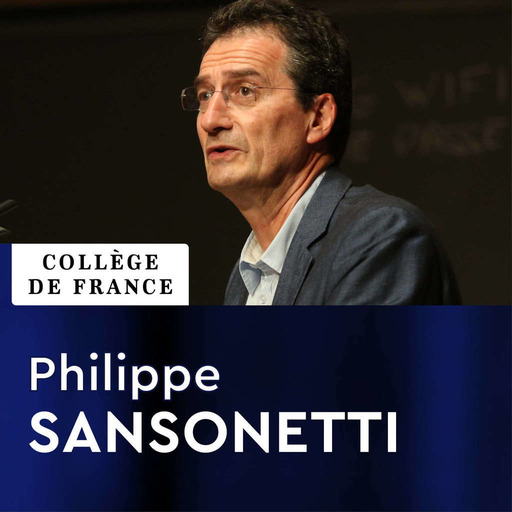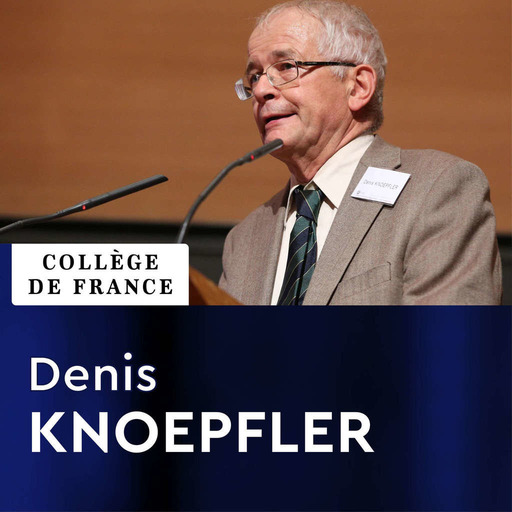
|
The Experience Points PodcastJorge Albor, Scott Juster, Experience Points
A weekly show from the authors of ExperiencePoints.net. Each episode we will have an in depth conversation on a particular video game related topic.
|
|

|
Génétique et physiologie cellulaire - Christine PetitCollège de France
Christine PETIT, Professeure de la chaire de « Génétique et physiologie cellulaire » La physiologie du système auditif, en particulier celle des premiers relais de traitement des signaux sonores, est assez bien comprise. En revanche, les mécanismes cellulaires et moléculaires qui la sous-tendent échappaient encore à toute caractérisation, au début des années 1990. L'approche génétique que le laboratoire du Professeure Christine Petit en proposa, a permis d'en initier le déchiffrage. Cette recherche adossée à l'identification des gènes dont l'atteinte est responsable de formes précoces de surdité chez l'homme, se développe sous la forme d'études multidisciplinaires. Elle éclaire les bases moléculaires de la formation et du fonctionnement de l'organe sensoriel auditif, notamment de ses cellules sensorielles ainsi que la pathogénie d'un vaste ensemble de surdités héréditaires du sujet jeune. Elle est aussi à l'origine de la découverte de nouvelles propriétés physiologiques du système auditif. L'objectif de la recherche s'est élargi depuis peu à l'élucidation de la pathogénie de la presbyacousie, surdité neurosensorielle liée à l'âge, et à une approche thérapeutique du syndrome Usher. Les cours de Christine PETIT portent sur le système auditif, son fonctionnement et ses dysfonctionnements. Ils s'adressent à un public intéressé par les neurosciences, la psychoacoustique, la musique et les troubles de la communication acoustique. Professor Christine PETIT is holding the chair of "Genetics and Cellular Physiology". Despite the amazing knowledge gathered on the physiology of the auditory system, especially at the peripheral level, the sensory organ and its innervation, the underlying molecular mechanisms, were escaping characterization. Then, on the grounds of the identification of the genes causative for the early onset forms of deafness in humans pioneered by Professor Christine Petit, her laboratory set off to decipher the cellular and molecular mechanisms of hearing, the way in which the auditory system develops and processes acoustic signals. Crossing the boundaries between medical and basic research fields, multidisciplinary analyses enable this laboratory to decipher the molecular physiology of the sensory organ (especially of auditory sensory cells), the pathogenesis of a large spectrum of inherited deafness forms and also to uncover new physiological properties of the auditory system. Today, its research encompasses additional objectives, such as in particular the treatment of Usher syndrome, using a gene-therapy approach of the retinal defects associated to congenital profound deafness and the elucidation of the pathogenesis of presbycusis, age-related sensorineural hearing loss, in the perspective of preventing and alleviating this very frequent communication disorder.
|
|

|
Microbiologie et maladies infectieuses - Philippe SansonettiCollège de France
La chaire de Microbiologie et Maladies Infectieuses dont Philippe Sansonetti est le titulaire a pour objectif de présenter les grands problèmes et les principaux défis posés par les maladies infectieuses dans un monde globalisé et de procurer aux auditeurs une capacité de lecture et d'analyse de ces problématiques complexes. L'approche prise est essentiellement fondamentale. Elle vise en particulier à présenter l'état de la recherche en cours dans des domaines divers mais complémentaire comme la microbiologie fondamentale, les mécanismes moléculaires et cellulaires des processus infectieux, les réponses immunitaires de l'hôte et leur manipulation par les microbes, le développement d'approches nouvelles, thérapeutiques et vaccinales, promettant un meilleur contrôle des maladies infectieuses. Ceci représente le coeur de l'enseignement qui s'enrichit, grâce à des séminaires d'experts, de présentations sur des sujets très spécifiques, y compris dans des domaines adjacents comme l'épidémiologie et la santé publique. The Chair of Microbiology and Infectious Diseases held by Philippe Sansonetti is aimed at introducing the major issues and challenges related to infectious diseases in a global world, and to offer keys to students to better analyse and understand this complex topic. The approach taken is deliberately basic. It aims to present the current status of research in diverse but complementary domains such as basic microbiology, the molecular and cellular mechanisms of infections, host immune responses and their manipulation by microbes, the development of novel therapeutic and prophylactic approaches, particularly vaccines, to better control the threat. This is the core of the teaching which is strengthened by seminars given by experts on very specific topics, including in adjacent areas such as epidemiology and public health. Les enseignements sont diffusés avec le soutien de la Fondation Bettencourt Schueller
|
|

|
Épigraphie et histoire des cités grecques - Denis KnoepflerCollège de France
Professor Denis Knoepfler Chair of Epigraphy and History of the Ancient Greek Cities Professor Denis Knoepfler is a distinguished scholar in the field of Greek inscriptions and ancient Greek history. The Professor's lectures and seminaries are devoted particularly to Hellenistic history, institutions and cults of Athens, Euboia, Boiotian cities and Federal States. The research fields of his assistants are the history and the inscriptions of Mylasa, Labraunda and Sinuri (Damien Aubriet) and of Megara and Megarian colonies (Adrian Robu). Les enseignements sont diffusés avec le soutien de la Fondation Bettencourt Schueller
|
|

|
The NodGimlet
A podcast from Gimlet Media that explores both the biggest moments and most underexplored corners of Black culture. Hosted by Brittany Luse and Eric Eddings.
The Nod tells the stories of Black life that don’t get told anywhere else, from an explanation of how purple drink became associated with Black culture to the story of how an interracial drag troupe traveled the nation in the 1940s. We celebrate the genius, the innovation, and the resilience that is so particular to being Black -- in America, and around the world.
|
|

|
How to Cook Fish by Olive GreenLoyal Books
One hundred simple fish sauces. Sixty-five ways to cook mackerel. The Catching of Unshelled Fish. Twenty-seven ways to Cook Frogslegs. Now that should certainly make you reach...
One hundred simple fish sauces. Sixty-five ways to cook mackerel. The Catching of Unshelled Fish. Twenty-seven ways to Cook Frogslegs. Now that should certainly make you reach for your apron and fish knife!
How to Cook Fish by Olive Green is a vintage culinary classic, filled with simple, easy to follow recipes rendered in a terse, no nonsense style. There's none of this fiddling with scales, weights and measures. What you get is a mélange of interesting, unusual ways to cook seafood without worrying about lists of ingredients, timings, temperature or any of the conventions followed by traditional cookbooks.
If you've read that old Victorian favorite, Lavender and Old Lace (which was later adapted very successfully as Arsenic and Old Lace) by Myrtle Reed, you'd certainly be interested to know that the author had an equally successful career as a writer of popular cook books. Writing under the pseudonym Olive Green, Reed published six very successful books on cooking. However, from 1898 to her suicide in 1911, she continuously published at least one novel every year. The books are romantic and highly emotional in nature, full of unrequited passion, revenge, mystery and supernatural happenings. She also wrote a collection of stories about important women who made a difference to society. In between, she wrote pamphlets, married her Canadian pen-pal, suffered severe and debilitating bouts of insomnia and engaged in charity work.
Her cookbooks are characterized by interesting tips on home making and the art of cooking, peppered with literary nuggets and quotations, witty remarks and anecdotes, all of which make How to Cook Fish not just an excellent recipe book but also an interesting and entertaining read. She also provides lists of what fish are in season during particular times of year, thus ensuring that the cook uses only the freshest of ingredients.
How to Cook Fish is divided into 45 chapters. The One Hundred Fish Sauces are arranged in alphabetical order, starting with “Admiral Sauce” and ending with “White Sauce.” In between you have recipes for “Brown Tomato Sauce” “Sicilian Sauce” and other such unusual concoctions. Under the chapter One Hundred Miscellaneous Recipes you have items such as Fish a la Brunswick, Chartreuse of Fish, Jellied Fish Salad and many other great variations.
This is indeed a great addition to your kitchen library and the clear, simple way in which the recipes are presented would tempt even the least adventurous of cooks to try a hand at one of these delicious sounding creations.
|
tous les 6 résultats

